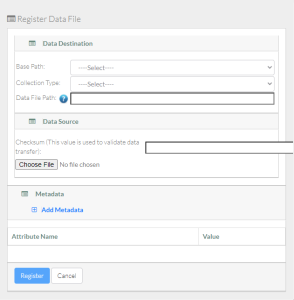 |
Page History
If your user account has the Write or Own permission level on an existing collection in DME, and if that existing collection has been configured to contain data files, you can register a data file into that collection (up to 10 GB). This page describes how to register one data file at a time. For instructions on registering multiple files, refer to Registering Data in Bulk via the GUI.
To register a data file:
- Log in as described in Logging In via the GUI. The Dashboard appears.
- Select a method:
If you are not familiar with Browse for the data destination, browse for it, as described in Browsing for Data via the GUI. Navigate to and right-click the collection in which you want to register your data file. Click Add Data File. The Register Data File page appears.If you are familiar with the data destination, select this method(Another option is as follows: Click Register tab > Data File.) The Register Data File page appears.
If you browsed to the data destination, that portion of the page has only the Data File Path field, with a system-generated collection path already specified. If the Base Path and Collection Type fields are available, specify the data destination:
Select the base path specified by your group administrator. An information icon () appears next to the Base Path field and the system begins to populate values in the Collection Type field and the Data File Path field.
Consider examining the valid hierarchies hierarchy for the selected base path. To do so, click the information icon next to the Base Path field. A Valid Hierarchies chart appears indicating the collection type or types allowed within each collection type. In the chart, a check mark indicates each collection in which you can register data files.
To close the Valid Hierarchies chart, click elsewhere on the pageData Hierarchy and Metadata Structure chart appears. For details, refer to Viewing the Data Hierarchy and Metadata Structure for an Archive.- If there is more than one collection type, select the one in which you want to register data. For guidance on selecting a collection type, refer to your group administrator. For some collection types, the system displays a list of required and optional metadata attributes.
- Specify the data source:
Consider specifying a checksum for validation of data transfer.
Include Page shared info - checksum option shared info - checksum option Include Page shared step - select data file shared step - select data file
Include Page shared step - specify data file path shared step - specify data file pathClick Choose File. Navigate to and select your data file. The system appends the data file name to the value in the Data File Path field.
In the Data File Path field, specify the full path, including the base path and the name of the file you intend to register. The characters allowed in a file name depend on the operating system:
- Windows accepts any characters except forward slash (/), backslash (\), colon (:), semicolon (;), asterisk (*), question mark (?), double quote (“), less than (<), greater than (>), pipe (|), or space.
- Other operating systems allow any characters except question mark (?), semicolon (;), backslash (\), double quote (“), or space.
Consider the following example:
Path Example Base path /SAMPLE_Archive Data file path /SAMPLE_Archive/PI_Lab_Name/ProjectN/data.txt - Consider hovering over the information icon () for each required attribute. A tooltip appears with information about that attribute.
- Specify the file metadata:
Include Page shared step - add metadata shared step - add metadata If you change your mind about adding an attribute, leave the name and value fields blank for that attribute. The system ignores a blank rowclick the trash can icon next to that attribute. If you proceed to update the collection with a new attribute, the attribute name is permanent.
Include Page shared step - specify attribute values shared step - specify attribute values
Include Page shared step - register file shared step - register file Click Register. The system checks whether the data you have entered is valid for the selected base path and collection type:
- If the data you have entered is not valid, the system displays an error message.
- If the data you have entered is valid, the system saves the new data file and metadata. The Data File page appears, displaying details about the new data file. For information, refer to Viewing Metadata via the GUI.
